|
On reflection, what I loved most about Artificial Eye's first Volume of the films of Claude Chabrol, other the fact that it features two films not previously available on DVD, is its comparative gender shift after Inspector Lavardin from a male to female point of view. In both Betty and Merci pour le chocolat, not only does the female gaze give Chabrol a new perspective from which to set about dismantling the establishment, but through it, Artificial Eye has unknowingly given us a powder keg double bill of reactionary extremes to the gender demands of bourgeois social oppression. Viewed as two sides of the same coin, these films though eight years apart, are very much companion pieces, both showing how bourgeois women simultaneously have cloying expectations shouldered upon them while all manner of responsibility is taken away from them. Betty, the eponymous character played by Marie Trintignant, bows to these pressures by running away into an imposed alcoholic exile, while these same pressures drive a murderous, territorial instinct in Isabelle Huppert's Mika in Merci pour le chocolat.

I've always considered playing drunk – never mind full-blown alcohol dependency – one of the hardest challenges that can be asked of an actor; not just the physical toll that whisky, beer chasers and empty shot glasses take on a character, but the psychological torment of living with a devil on your shoulder, always tempting. While Jeff Bridges' Oscar-winning portrait of washed-up country singer, Bad Blake in Crazy Heart, convinced me within minutes of a world-weary, boozy life lived, the struggle with alcohol that is so integral to his character was not focused on nearly half as much as the evidence suggests it should have been. Throughout, he stinks, sweats and vomits and through it all, Bridges empathetically plays the effects of such self-destructive behaviour, but is let down by a script that forgets to ask why. A late stage requirement of the screenplay is that his recovery from a lifelong addiction is solved with a tacked on title card: "16 months later". While I understood that that film was less about recovery than redemption, the film comes off as either naively ignorant or downright lazy in not connecting how the two are, for all intents and purposes the same thing.
Betty is a film that never once takes the easy option of abruptly oversimplifying for the convenience of its screenplay. Just as with Crazy Heart, the film is above all a character study and appropriately, Chabrol takes his time in examining all the aspects and events of Betty's life that have led to her searching for answers at the bottom of a bottle. The director, with his sober outlook, poses questions the inebriated Betty is incapable of asking. Not content to deal with alcohol as the problem, Chabrol wants us to examine the problems that drove Betty to alcohol.
One evening, a similarly intoxicated doctor encounters the emotionally destitute Betty and no sooner have they drained their glasses, than he's welcoming her to the fold of alcoholics identified, known as "The Hole". This boozer's wonderland where misery and company sit beside each other barside, offers its regulars false camaraderie, or at the very least, self-pitying recognition of just how far Alice has fallen down the rabbit hole.
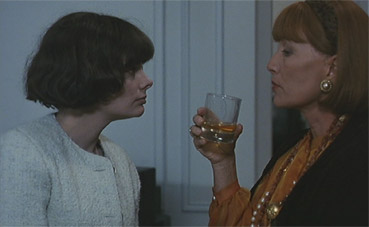
In amongst this legless circus of the bereft, bombed and buzzed, Betty finds an unlikely custodian in Laure (Stephane Audran), an older woman who has suffered the same fate: banished from a life of wealth, privilege and loveless neglect.
We quickly learn in an elliptical flashback structure, how Betty was unable to live up to the duties of a trophy domestic housewife. Carrying her first child, she is regarded by the family only as a vessel for the baby, not its mother. The responsibilities of caring for the newborn status symbol invariably fall to the maid, in whom the family indebt a far greater degree of trust than the outsider their son married.
Rarely has jumping back and forth between the past and present had such a devastating, fatalistic ripple effect. Each time we return to The Hole, every empty glass self-loathingly slammed down, accumulates and echoes the weight of past regrets just witnessed. Sunken-eyed and at the end of a frazzled rope, Marie Trintignant plays substance abuse and emotional intoxication with a threadbare authenticity, placing her in the company of the silver screen's most harrowed drunks, from Albert Finney in Under the Volcano, to Nicolas Cage Leaving Las Vegas. Though unlike those great performances, Trintignant doesn't betray her character's utter exhaustion to the temptation of scenery chewing, instead she simply sits, stews and seethes, sweating out as much liquor in frustration as she chugs in desperation.
As the film progresses we learn that however poisonous bourgeois life might be, Betty's soul was already tainted by self-harm from an early age. When she has wreaked as much havoc as she can upon herself, instinctively it turns itself outward onto others. Heartbreaking as it is to see Betty hit rock bottom, it's positively gut wrenching having to watch her contaminate and supplant the life of the woman who tries to help her. Chabrol's casting of Stephane Audran makes this parasitic transference of power that much more cruel, given that Audran, twenty-five years prior, was the younger woman who appropriated the life of her benefactor in Les Biches. Betty's takeover is not a hostile, calculated one however, just a last breath attempt to claw her way out from under emotional rubble towards the chink of light, Laure allows her to glimpse. Having lost everything but her own life, Betty is only doing what we all fear we might be capable of in her shoes: whatever it takes.
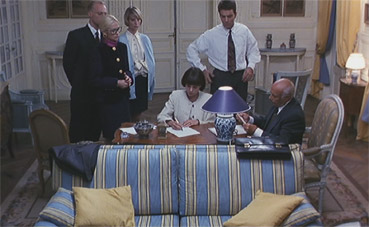
"Whatever it takes" is not just the practice of Isabelle Huppert's disturbed wife in Merci Pour Le Chocolat, but her very ethos, something you wouldn't be surprised to learn she chants as a daily mantra. A principle so deeply ingrained that she goes so far as to routinely poison her family members, perhaps to exert a degree of control similar to that which she wields in her inborn role as a chocolate magnate, an influence she lacks in her domestic situation. Only, the pathology runs far deeper than that. Activity this psychotic is her very nature and she is helpless to stop herself. As the title of Charlotte Armstrong's source novel, "The Chocolate Cobweb" would seem to suggest, Mika is the spider in her own web, disabling the mobility of her victims with spiked coco. This metaphor is confirmed in the overt symbolism of Mika knitting a sofa rug in the shape of a black web, and in the film's most striking and haunting sequence, we see Huppert curled up at the edge of this web like a spider, ready to strike.
Of course, what is typically compelling about any of Isabelle Huppert's performances is that they each hint at so many possible emotions, without accentuating any one of them that would risk defining the character. They go out of their way to defy the kind of concrete conclusiveness I'm attempting to affirm here.
Huppert, curled up on a sofa saying nothing at all is a silent tableaux in which the formidable actress is still able to perplex. Her positioning at the edge of the symbolic web, could in itself symbolize defeat just as much as the hunter on her own turf. Mika does at one point admit that she does what she does, partly out of boredom. Perhaps this feeling is synonymous with Betty's stagnation in the earlier film, but instead of running away, Mika is rallying against the bourgeois web of coercion that ensnares them both.
Usually when a film relies this heavily on symbolism and psychological examination as its main points of interest, it goes out of its way to clear up any ambiguities, with a thorough explanation of the various motivations so as to satisfy the audience upon leaving the cinema. Chabrol is obviously keenly aware of this, and like the spider in his web, he toys with the viewer's expectations. He sets out to, and more than achieves an experience that leaves us with fewer certainties at the end than at the beginning. In his own words (taken from the text interview in the bonus features), the "certainties arising during the film are destroyed little by little… in the end, there's not a lot that remains, a kind of chasm". His point being that, what comes naturally to us we don't tend to question, however bizarre, extreme or socially unacceptable.
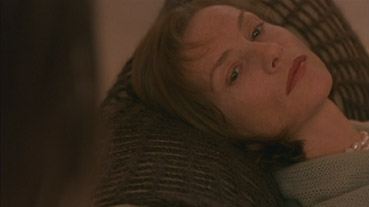
What we do know specifically, is that Mika is poisoning her family; relying on hot coco for her sleepwalker of a stepson, Guillaume (Rodolphe Pauly) and a dependency on sleeping pills for her concert pianist husband, André (Jacques Dutronc), possessed of a face as unbelievably groggy as the effects of his addiction, we first encounter husband and wife as they have just been wed for the second time in an opening scene that tellingly evokes the archetypal "black widow" of film noir.
From this unusual and intriguing set-up, questions rear themselves almost immediately. Why is Mika doing this and to what end? The answers are complicated and piled upon with the arrival of promising young pianist Jeanne (a gumptious Anna Mouglalis), who has recently learnt through her mother, of a mix-up at the maternity ward where she was born, that calls both her and Guillaume's paternity into question. Whereas Guillaume has inherited none of his father's drive or gift for music, Jeanne is a determined would-be virtuoso, who brings André back to his glory days of youth as a player. Pictures of André's deceased second wife (an event to which Mika is also connected) also happen to bear an uncanny resemblance to Jeanne.
The search for straight answers is a thread unraveled by Chabrol's unusual choice of making his film playful and light-hearted in tone, and it is the sleight of hand of not putting Mika's obviously murderous intentions front and center, that floats the film buoyantly in a wash of suspense. Though we can figure it all out within the first few scenes, we have no idea of how we arrived at the answers. Not so much a whodunit as a "whydunit" (and even in this respect Chabrol isn't looking to put a bow on it), the suggestively lingering camera clues us in early on, to be on our guard and look for clues in the smallest of details. Tension is built by forcing the civility of the family's every interaction with Jeanne; it's so picture perfect that we can't help but suspect it. As a result, every conversational exchange comes under scrutiny and we are pointedly made aware of off-stage action, because as the film progresses, it starts to put just as much importance on what's revealed off-screen as what's in the frame.
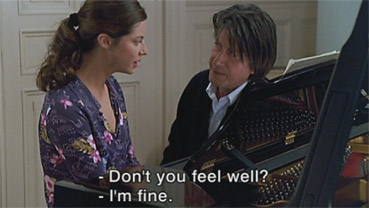
Of the film's many mysterious worth mentioning is one not quite as dramatically prevalent but equally as fascinating. The juxtapostion of an ostracise mother and stepson against the growing bond of a teacher and student is an attempt to lock-pick a mystery at the core of the human heart. These pairings reveal a constant tug of war between intellect and emotion, and how in some personalities this struggle is rather one-sided. Chabrol positions the artist (represented by André and Jeanne) as the only one who can live truly passionately, but in so doing, must be selfish to the point where anything that falls outside of that passion is rendered irrelevant. This accounts for Andre's passivity and downright indifference to his wife, even when she is acting out at her most diabolical. It also explains how Jeanne is headstrong to the point of rudeness, talking back to her mother and ignoring her advice before invading Mika's home. Jeanne it turns out, also subscribes to the philosophy of "whatever it takes", playing the family as capably as he does the ivory keys, though in the end, this house isn't big enough for the both of them.
While we might have a hard time getting to grips with the mindsets of these characters, the warring mind games they play with each other are gripping enough on their own. It's only once the film is over that we're confronted with unpacking their intentions.
Betty is correctly framed at 1.66:1 and anamorphically enhanced and is clean of any obvious blights, including almost all dust spots. The detail is good and the contrast reasonable, though it is softened a little by the pastelle colour palette and more so during darker scenes to retain detail that would otherwise by lost to the shadows. I would say that the image has more punch upscaled to a Plasma screen than the grabs above suggest.
Merci pour le Chocolat fares slightly less well, being essentially a re-issue of Artificial Eye's previous stand-alone disc. The transfer is once again clean and reasonably detailed, but the framing is 1.85:1 and research suggests that this is a crop from a 1.66:1 original, something intermittently visible in the clipping of the tops of heads on some mid shots and medium close-ups, resulting in framing that at times feels uncomfortably tight. The colour palette doesn't feel completely natural, with many scenes having an earthy hue – whether this was intentional only a comparison with the original film print will confirm. There's also a suspicion that some enhancement has taken place, which could be the source of a faint grain pattern detectable on areas of single colour, most visible on a pan shot following a car at the very start of chapter 12, where the pattern remains unchanged throughout the camera movement. The subtitles are also burnt in rather than removeable, suggesting a second-generation source for the transfer.
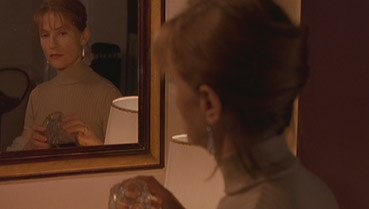
Both soundtracks are clear and free of damged, hiss and fluff, with the stereo track on Merci pour le chocolat having more depth that the mono track on Betty. Some separation on Merci is detectable, but never that pronounced.
With Betty, just as with Inspector Lavardin, extras comprise solely of trailers for the combined six films featured in both volumes 1 & 2 of The Essential Claude Chabrol, as well as the director's latest on Region 2, The Girl Cut in Two.
Given that these are long sought after films finally arriving on DVD, I don't want to complain too loudly, but at the same time, given that I was so readily able to make a connection between Betty and Merci pour le chocolat, it would have be nice to see some kind of featurette in which Claude Chabrol discussed the thematic links of his work.
Where the two DVD premiers have similar menu screens based on the set's cover art, Artificial Eye, for some strange reason forgot to be cohesive in this respect, not updating Merci pour le chocolat at all, giving us an exact replica of the film's standalone disc, which annoyingly, as well as retaining the same dated looking menu screen, also keeps the burnt in subtitles, for which there's no excuse in this day and age.
However this is the one disc that does contain some (pre-existing) bonus material and while it's a rather skeletal package, they're certainly worth a watch.
Making of Documentary (26.00)
On set footage and interviews (including extended words from Isabelle Huppert, not found in her separate interview) detailing Chabrol's working methods and his precision with camera movements and the logistics of making small details read on-screen. The director exacts that same precision with how each and every note of the piano music in the film is played, something Huppert attributes to his son being the composer on many of his films. Chabrol's producer, Marin Karmitz adds that music is always one of the first elements considered in a Chabrol film, preceding production. Karmitz is more impressed that a man with no evidence of evil in him has managed to master the pathology of evil and the ways in which it repeats itself.
Jacques Dutronc amuses, emanating Gallic cool in aviators and smoking a bloody great big cigar. We're told that Chabrol's wife picked him for the role because "she fancied him". On multiple occasions we see Chabrol, disagreeing with the decisions of his crew and the crew being just as questioning in return regarding his changes, though this is all expressed with much deference towards the director, who gives the impression of having being born on a film set.
The most memorable and telling anecdote from Chabrol himself, is one that refers to his whole body of work and not just this film, though it does go a long way in helping us begin to unlock chocolat's peculiar qualities. Chabrol's approach to genre is not so concerned with its rules as it is emphasis and tone. Not adhering to any strict playbook and being unafraid to experiment, his films are iconoclastic examples of the genres they inhabit and in this way, Merci pour le chocolat is no exception.
Isabelle Huppert Interview (7.09)
The interview itself only takes up about half the already brief running time, during which Huppert talks about the contradiction of her character, Chabrol's lack of ego and narcissism, and the idea of a recurring Chabrolian heroine.
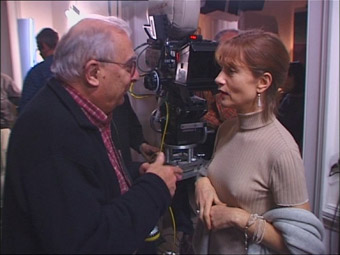
We then cut to an on-set discussion between the actress and her director, debating if Mika should cry at the end and if so, how much is appropriate? Chabrol points out that even one tear may be too much; "too American", "very ‘Actor's Studio'".
The resulting shot in the completed film is marked just as much by the authorial fingerprints of Huppert as Chabrol. The clip demonstrates how beyond being a great collaborator, Huppert is as focused and in control off the screen as on. The segment ends with an extended clip of the film's final moments.
Anna Mouglalis' screen test (10.30)
Amongst the filmographies for the main players and the director, you'll also find Anna Mouglalis' screen test. This consists of the then twenty-one-year-old actress playing out three scenes on camcorder opposite her co-star, Rodolphe Pauly, that the casting director sometimes has them repeat. At the end of each scene, we get the version from the finished film and in all of these, we see a more polished performance, Jeanne being significantly more domineering and assertive.
Lastly there is a text interview with the director (a short, sharp read) in which he discusses how he came upon the story and the right mode of telling it and his repeated use of Isabelle Huppert in lead roles. An easygoing piece until he rather shockingly links the neutrality of his characters' Swiss nationality to their capacity for criminal behaviour. Swiss nationality as it turns out, is also the reason Mika uses chocolate to drug people and not wine.
A psychoanalyst's wet dream, we get not one, but two of the richest and most nuanced performances under Chabrol's guidance. Both are so towering, Chabrol has clearly had to step up directorially to meet them halfway. Of all of his films I've seen so far, these two really mark themselves out. In her role, Marie Trintignant's rock bottom soul bearing is unmatched. As an arch manipulator in a long line of troubled characters Huppert has played for Chabrol and other directors, Mika is surely one of the most perverse and complex of her career, which really is saying something when you consider her parts in The Piano Teacher and the more recent Home. While Inspector Lavardin is best suited to the already converted, the rest of the set, despite skimping on extras, comes with the highest recommendation. If you want characters, that'll you'll still be thinking about days afterward, look no further. Volume 2 can't come soon enough.
|